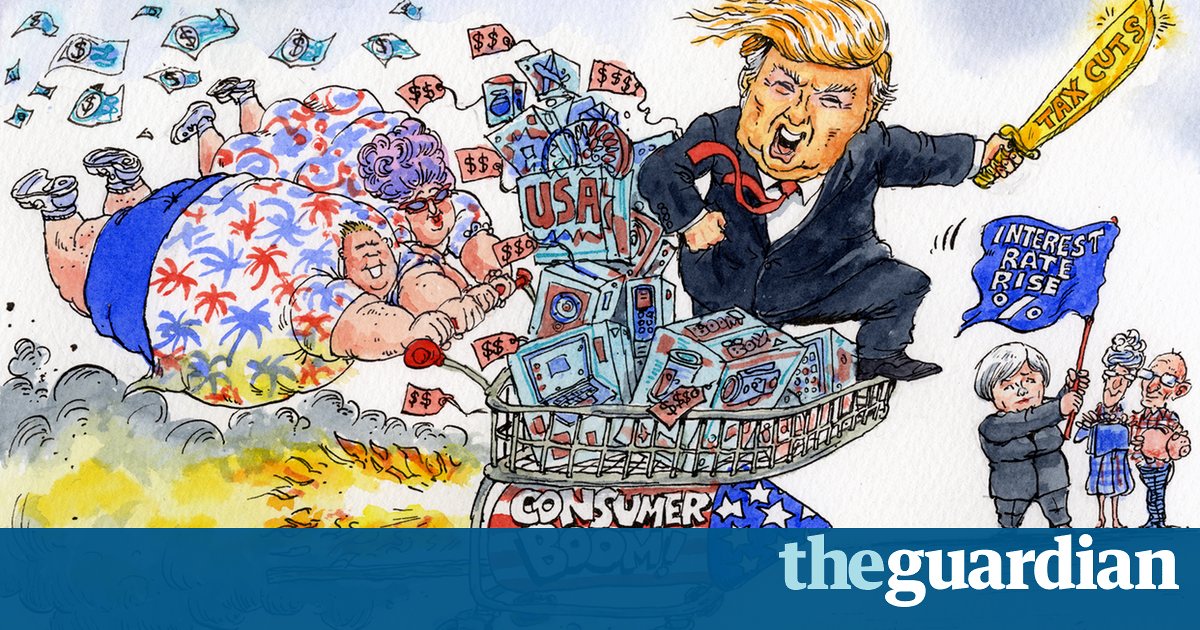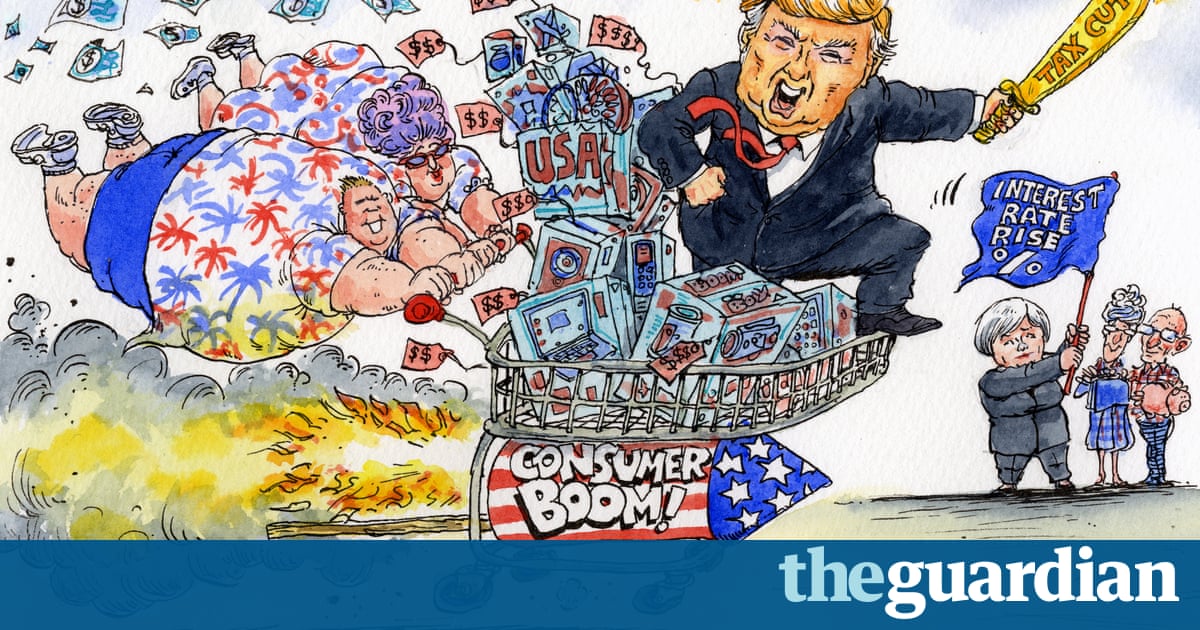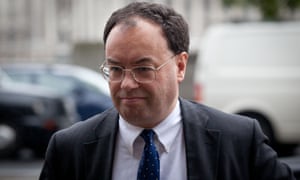Donald Trump has a handy scapegoat when economic clouds appear

Bouncy consumer confidence plus tax cuts will probably make a mini-boom in the US next year. But when the inevitable inflation storm hits, it will be someone elses fault

US president-elect Donald Trump is known for boasting: The beauty of me is that I am very rich. Its a comment that he hoped underline his independence from corporate lobbying and his prowess at making money.
Since his victory, most of America appears to be believe his property industry wheeler-dealing will turn an already fast-moving economy it was zipping along at a 3.2% annualised rate in the third quarter of 2016 into the stellar performer it was in the 1990s.
As an appetiser to this feast of growth, the US is about to get a rise in interest rates courtesy of the Federal Reserve, from the current 0.25%-0.5% target range to 0.5%-0.75%.
For the savers who form the backbone of the Trump electorate, it could be the first of many if the economic growth rate accelerates in 2017.
Fed chief Janet Yellen, who was once in Trumps sights as a Washington swamp dweller, will probably be declared a hero of the thrifty common man and woman when she makes the announcement on Wednesday. Yellen will talk of the strengthening manufacturing sector and the gathering momentum in the housebuilding industry. Retail sales are also buoyant, which is no surprise after surveys showed consumer confidence spiking in November.
To illustrate the faith consumers have in a Trump presidency, the Conference Board consumer confidence index shook off a dip in October to regain pre-recession levels. And the CNBC All-America Economic Survey found that the percentage of Americans who believe the economy will get better in the next year climbed by an unprecedented 17 points to 42% the highest it has been since Barack Obama was first elected in 2008.
During the election campaign, Yellen was circumspect about further interest rate rises, fearing that any green shoots would wither and die. This reticence dates back to the decision to raise interest rates last December the first increase in almost a decade when minutes of the Feds meeting revealed it had been a close call for some policymakers.
The new year brought a plunge in oil and share prices, and signs that global trade was weakening. Analysts scratched further rises from their forecasts.
Trumps win alters the character of the coming year. His nominee for Treasury secretary, Steven Mnuchin (pronounced Mi-new-chin) has already declared he wants to cut taxes as much for middle-income earners as for big business. The former Goldman Sachs deal-maker also wants to tear up business regulations to spur growth of 3% to 4%, year in, year out.
If the consumer confidence figures are anything to go by, a burst of high-street spending will trigger a mini-boom, with the tax cuts kicking in later in the year to keep the momentum going into 2018. But what then? The prospect is that inflation will take off, the dollar will soar and a rush of imports will send the balance of payments further into deficit. Inflation will hurt consumers, while an even stronger dollar depresses exports. USA Inc is already squealing about the dollar. To say they will be furiously lobbying the White House if it heads any higher must be an understatement.
Trump will want a scapegoat. Rather than Yellen, its likely to be the Chinese and any other trading partner deemed to be somehow ripping off US households. The Chinese, in Trumps map of global villains, get full access to US markets at artificially low prices following several years of currency manipulation. US companies also the president-elect alleges have their patented secrets stolen, and access to Chinese markets blocked.
He has so far backed away from a confrontation with Beijing, except for his acceptance of a call from the Taiwanese premier. But a trade war with China is a card he could still play if his mini-boom gets out of hand.

Not the time to go soft on RBS
Andrew Bailey looks like everyones favourite uncle. But if the events of recent days are anything to go by, the chief executive of the Financial Conduct Authority represents proof that looks can be deceiving.
In the space of a week, Bailey has cracked down on spread-betters, crowdfunders and peer-to-peer lenders as well as. He has also sent a warning shot to the banks that they could be on the hook for even more claims for mis-selling payment protection insurance.
This is not what was expected of Bailey when he was cajoled out of the Bank of England this year into his new job by the then chancellor, George Osborne. Last summer Osborne chose not to renew Martin shoot first ask questions later Wheatleys contract as FCA head in what was regarded as a signal that the Conservative government intended to take a more conciliatory approach to the City.
On the latest evidence, any comfort the City took from Baileys appointment was misplaced. In the post-Brexit world, Europes financial centre might have had reason to hope for an easier ride from its regulators as it battles to prevent financial business moving to the US or Europe. Baileys swipe last month at fund managers just one of many financial industries now at risk and their sustained, high profits showed that he is not yet ready to listen to special pleading.
So, Bailey is off to a good start. But it too early to offer applause. There is plenty to do. One of the items near the top of his to-do-list is Royal Bank of Scotland. Bailey should ensure that the bailed-out bank is not let off the hook for any mistreatment of small business customers. He has warned MPs on the Treasury select committee that the crucial report into how small business were handled could be subject to Maxwellisation. This means individuals mentioned get a chance to respond to what is said about them prior to publication. Bailey should ensure this does not stop the RBS report being published in full.
Will we ever see a normal Sports Direct?
Mike Ashley really doesnt get it, does he? Last week Sports Direct unveiled a 57% slump in half-year profits, together with details of a new deal that could eventually hand big rewards to his 20-year-old daughter.
Oh, and the company is about to take delivery of a new $50m corporate jet which will facilitate efficiencies relating to management time.
One of the main grievances shareholders have with Sports Direct is that Ashley runs it like a private company.
There are other deviations from conventional listed-company behaviour. SD has not had a proper finance director for some three years. Ashleys number two, Karen Byers who he says actually runs the firm is not on the board either. Chairman Keith Hellawell is widely regarded as a patsy by independent shareholders. They voted for him to go.
Will Sports Direct ever be run according to accepted norms? Not while Ashley is in charge.
Read more: https://www.theguardian.com/business/2016/dec/11/trump-us-economy-boom-inflation-china